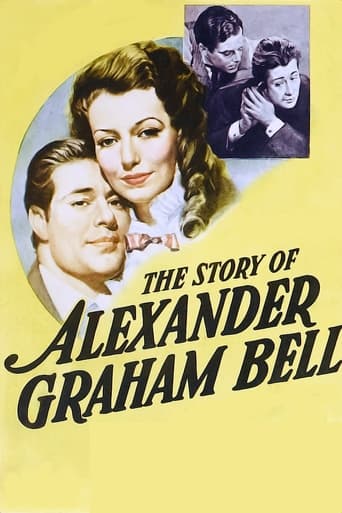

This Movie Can Only Be Described With One Word.
... View MoreTrue to its essence, the characters remain on the same line and manage to entertain the viewer, each highlighting their own distinctive qualities or touches.
... View MoreThis movie feels like it was made purely to piss off people who want good shows
... View MoreThis movie tries so hard to be funny, yet it falls flat every time. Just another example of recycled ideas repackaged with women in an attempt to appeal to a certain audience.
... View MoreMovies from the first part of the 20th century that are based on actual facts are combine mostly two elements: one of them is good acting full of passion, joy, excitement, real acting. The other are factual inaccuracies. This thing happened to "Rasputin and the Empress", it happened to "Dracula" (well not actual facts but also not really true to the Bram Stoker novel). The same thing you will find also in this emotional movie. Don Ameche is portraying the role of Alexander Graham Bell full of excitement, as a young man who is dying of showing his telephone to the world, he wants to create something new. But has he really done it? Especially movies with great actors like this (Henry Fonda, Don Ameche, Loretta Young, ... ) creating a new world for the audience. So after watching this movie many people actually believe the legend of Alexander Graham Bell actually invented the telephone, even through it's not true. However now everyone knows or should know that Bell has never invented THE telephone neither the words "Mr. Watson, come here, I want you" are the first words ever spoken in a telephone. It was actually Antonio Meucci in 1860 and Phillip Reis in 1861. The last one make the telephone actually work and spoke the first time in history into the telephone. Afterwards in 1862 he has presented it in Edinburgh, where Bell saw this device and was asked by his father Alexander Bell to make this better. Bell did and made himself a name in history. But this all make the story of the telephone in the movie very inaccurate for a man who takes credit for something he hasn't really done. However this is a feature film, not a documentary about the invention of the BELL telephone, about A telephone.I like also that they are not basically are telling about the telephone but about the love to Mabel, great portrayed by Loretta Young, the vision of a young intelligent man and also how he helps deaf people to talk. These aspects make this movie a very good drama movie, that is also recommendable to watch (especially if you know the truth ;-) ).
... View MoreIrving Cummings does an excellent job directing the cast of assembled actors in this film. The story itself is taken from the memories of the daughter of Alex Bell and follows through with all the trials and tribulations of Bell himself. Beginning with the decision he gave up teaching the deaf and dumb to speak and through the obscure and menial existence of an inventor, up through the difficult task fighting for his invention in court. Don Ameche plays Alexander Graham Bell, who does so with such spirit and vitality, audiences will later realize why this actor is so synonymous with the character. The same is true with Henry Fonda who plays Thomas Watson who also is easily identified with this movie. Loretta Young, Charles Coburn and Gene Lockhart are magnificent and help insure this black and white becomes a solid standard in any collection of what we now understand as Classic films. ****
... View MoreI felt compelled to click the "Contains spoiler" box for a story about Alexander Graham Bell, the "spoiler" being that he invented the telephone. What does that tell us about the end of civilization as we know it? Actually, this is an engaging movie, although I believed only certain features of its presentation. Alexander Graham Bell was born. He invented the telephone. He died. Of those points I'm sure. I guess his wife was deaf and Bell himself, a Scot by birth, was preceded by two generations of writers interested in the mechanics of speech and associated pathologies. And we know he had an assistant named Watson, Henry Fonda here, because of that famous first voice transmission -- "Watson, come here. I need you." I'm doubtful that it was caused by Bell's having spilled sulfuric acid on his leg. It's true, too, that the success of the device was boosted when it was adopted in the palace of Queen Victoria, or so I was taught years ago in an anthropology course on culture change and innovation.But all that doesn't amount to much. The film is an entertaining piece of semi-educational family fare. Bell and Watson suffer through hard times together, punctuated by occasional breakthroughs or epiphanies, usually followed by more hard times. As Watson, Henry Fonda adds some necessary common-sensical and often softly funny observations about the lives they're leading. Too bad he more or less disappears from the movie about half way through, like Lear's fool.But it's Boston in 1875 and we see the obsessive Bell making his way through a light snow fall of cornflakes while children throw snowballs at him, a lamplighter lights a lamp, screaming children ride sleds along the sidewalks embanked by fake snow, and horses and carriage jingle their way down the studio streets. There are Christmas carols and mute children who learn to say "father", and Christmas dinners and presents, and a love interest in the appealing form of Loretta Young.There's something winning about these old-fashioned studio productions. In this case, the studio was 20th-Century Fox and the producer was Daryl Zanuck, renowned for his ability to polish a script into a nicely structured, well-written, and thoroughly commercial form, and for being a Goy from Wahoo, Nebraska. I love the fake snow and the teary children and the determined scientist distracted by love and the need for money. Even if you don't believe a word of it, it's still a comforting experience.Don Ameche approaches his role with the innocent hyperbolic enthusiasm of a child. Fonda seems sleepy and is all legs, like young Mister Lincoln. Loretta Young has calf-like eyes and a sweet smile and is so demure that she manages to suggest barely repressed volcanic passions. The supporting cast are mostly familiar -- Charles Coburn, Gene Lockhart, and Spring Byington -- and they turn in professional performances.The climactic courtroom battle is something of a let down. Poor Bell was the victim of innovational inevitability. The telephone was just one example of an endless list of simultaneous discoveries and inventions. I can only think of the gasoline-powered car, oxygen, radar, and the jet engine at the moment. In a way, culture advances in accordance with its own schedule and the inventors and discoverers acclaimed as genius's are its instruments, people who happened to be in the right place at the right time with the right temperament. If I can dig up that list of simultaneous inventions I'll post it on the message board.Anyway, a routine but likable biography from the old studio system, now thoroughly defunct.
... View MoreI always thought of him being an under rated actor. He certainly was versatile. He could sing, play comedy and drama, and if for no other reason, the academy finally realized his talents and gave him an oscar. It was long overdue. As for this film, he was very good and keep in mind Henry Fonda was playing a supporting role. As for Loretta Young..she was very lovely during those years, but her role had me squirming. As a deaf person, she spoke very well and the audience knows she's deaf because she makes it obvious as to her glaring at the actors mouths. I don't recall anyone mentioning if she was born deaf, or acquired it in later life.All in all, a satisfying film..thanks to Don's performance.
... View More